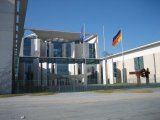A German Key to Europe?

Is Germany key to unlocking a Europe that seems to have got stuck after the French and Dutch referendum defeats last year?
That was the question hanging over all the discussions at this years version of the Aspec Italia European Dialogue. And this year the meeting left the more pleasant surroundings of Italy and moved to the immediate vicinity of Brandenburger Tor in Berlin.
Next weekend it is 100 days since the big coalition under Angela Merkel took power in Germany. It was essentially a coalition of losers - SPD had lost the election, and CDU/CSU had lost the election campaign. It was driven more by necessity than by desire.
Since then Angela Merkel has soared to heights of popularity never seen in the history of modern Germany. Not only is she towering over the German political scene in ways few could have foreseen - she has also emerged as something very close to an uncrowned Empress of Europe.
It's been a success of her style and it's been a success of returning to a more classical German foreign policy.
That's not bad.
But soon the hard issues of domestic reforms will have to be tackled. And there might well be some strains as a CDU soaring in public opinion and an SPD very much in the shadows face important elections in Baden-Wuertenberg, Rheinland-Pfalz and Sachsen-Anhalt in March.
In the discussions, the jury was still very much out on where the German economy is really heading.
Nearly all indicators are now very positive. The business confidence indicators haven't been so positive since the reunification of the country. Growth is likely to double between 2005 and 2006. There is no doubt that there is a significant upswing.
But is this merely cyclical, with the risk that it will all turn sourn a couple of years down the road? Or are there also structural factors at work. The economist were leaning towards the first conclusion. Some businessmen thought there were also element of the second.
With 5 million unemployed, the country certainly needs economic growth. But it will probably require growth substantially above 2 percent to start making a dent in the unemployment figures. And it will require sustain growth of that order to bring that figure down substantially.
Is that possible without substantial further reforms?
The Minister of Finance Steinbruecker naturally pointed at what is being done. The fiscal deficit might be down within the Maastricht criteria already this year and most certainly in 2007.
And the public expenditure share of the economy is now projected to decline to levels it hasn't seen since the early 1970's - it was around 48 % last year, and the aim is 43,5 % by 2009. Reforms have also made the labour market somewhat more flexible.
All agreed that the grand coalition is likely to stay the course. There was praise even from the SPD for the way in which Merkel runs the cabinet and its discussions.
But whether Germany can really unlock Europe remains to be seen.
The German presidency during the first half of 2007 - coinciding with the presidential election in France - will certainly be of key importande.
But with all other capitals more or less weakened, there is in fact little alternative but to lock towards Berlin.
And with the initial success of Angela Merkel that could well turn out to be a good alternative.



<< Home